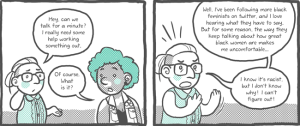(Content Warning: Rape culture)
Late last year, a web producer for The New Yorker named Caitlin Kelly (@atotalmonet) went on a Twitter tirade in the best way possible. In a series of tweets, she took the situation of a stolen wallet and twisted it into the same exact victim blaming that occurs to survivors of sexual violence.
Because a stolen wallet gets more of an empathetic reaction out of people.
Can we—can we just stop and register that for a minute? Thanks. Because that’s pretty fucked up. Not only do many people lack empathy for a survivor of sexual violence, but the only way we can try to get them to change their ways is if we ironically liken a survivor’s body to an inanimate object.
Ouch.
In case you didn’t know, sexual violence tends to be the only crime committed that somehow makes people believe that the survivor is either partially or fully responsible.
Survivors pretty much have to prove their worth before they can get any justice, whether it be legally or socially.
And if the perpetrator is any sort of known icon? Fuh-get about it.
Being a survivor who speaks out is a little like being on a Nickelodeon game show during the early 90s. You’re not allowed to win your brand new bike unless you prove your worth all while being jostled around and humiliated to hell.
Only you never entered the contest to get on the show in the first place.
And you probably won’t win the bike.
Because game shows are rigged like that.
Fuck.
But seriously, in the largest international study conducted on rape, UN researchers concluded that 1 in 4 men has committed rape. And while this study was focused on Southeast Asia, it is still relevant for other countries with strong rape cultures, including the US.
And on top of that, it’s estimated that only 2% of rape accusations have been concluded as false. (I have no statistics on how many people lie about getting their wallets stolen. Apparently nobody cares.)
So that’s…um…terrifying?
But I’m actually not here today to talk about why we need to spend less time teaching people how not to get raped and spend more time teaching people why not to rape. Even though that’s pretty much my jam, it’s not the only way to help stop rape culture.
Another way is for each of us to watch our own language when it comes to hearing about survivors of sexual violence.
They can be someone you know or someone you don’t. They can be a pop icon or your cousin. It could be something you heard through the grapevine or something told to you directly from the survivor in question.
It doesn’t matter.
What matters is your putting your own opinions and feelings aside so you can better articulate a helpful response.
Note the word “helpful” in that sentence. I’d draw little arrows around it if I could.
So what constitutes a helpful or unhelpful response? It can actually be tricky. Some of them may be obvious to you, but others significantly less so.
Even those of us with the best of intentions can have rape culture so deeply ingrained in us that we don’t realize the problematic things we’re saying.
When it comes to responding to someone who has just told you they’re a survivor of sexual violence, here’s what not to say and what you can say instead.
1. “So, What Exactly Happened?”
I can understand why someone may want to initially respond with this question. It’s the nature of humans to be curious, not unlike wanting to crane your neck as you drive by a car wreck.
The shock and surprise of the things we haven’t experienced or don’t quite understand is the very reason why television news has pretty much turned into just another form of entertainment. Even poor, old Weather Channel has click bait.
In the event of being told that someone you love is a survivor of sexual assault, you may be so caught up in shock and emotion that all you can think to squeak out is to ask for more detail.
But this isn’t a helpful response.
To ask what happened makes it sound like you’re implying that it can’t be considered assault until you decide it is – which, unfortunately, is something outsiders have been frequently known to do.
Survivors know better than anyone whether or not what they’ve been through “qualifies” as assault. They were there.
Even if your intentions are pure and the survivor knows this, it still isn’t a good idea to press them for more information, however gently. If they want to tell you the details, they’ll tell you the details. If they don’t, then they won’t. And if they don’t, it’s likely because they’re not in the mood for a PTSD spike today.
Try to flip it the situation, putting the burden of those mysterious details more on you than them. Instead of asking “What exactly happened?” say, “I’m always here if you ever want to talk more about it.”
See how much more supportive that sounds?
2. “Was It Really Late at Night?”
Variations to this:
- “What part of the city were you in?”
- “What were you wearing?”
- “What were you doing?”
- “Were you drinking/smoking pot/doing drugs before/during/after?”
Basically, bouncing back with any question that sounds like it’s loaded with implied victim blaming is a pretty bad idea if you’re looking to help.
Now, it’s possible for there to be innocent reasoning behind these kinds of responses. When someone you know has been hurt, you may become angry. You may want to press the survivor for all of their behavioral details so you can locate what exactly caused the assault to occur.
But it’s not what the survivor did or wore or smoked that caused the assault. It was a rapist. A rapist within an entire rape culture.
And that’s something that’s going to take a lot more work to fix than your asking all of your other friends to please stop walking home alone past 9pm.
Plenty of us want to focus on the false fixes and move on from there, if only so we can feel like we accomplished at least one positive thing in this whole ordeal that otherwise feels completely hopeless. But…you kind of sort of didn’t. (Sorry.)
Peppering survivors with questions of their behavior implies that the survivor somehow assisted in causing the assault to happen, which is something frequently done to try and dismiss assault accusations altogether.
Believe me, survivors don’t appreciate this.
What they would appreciate is something more along the lines of carrying a mattress in solidarity.
Instead of focusing on false fixes, show care toward your survivor loved one by engaging in activities that help bring an end toward rape culture itself.
3. “Was It Before or After You Transitioned/Came Out?”
Unless you’re an attorney trying to nail the bastard with hate crime charges on top of assault charges, don’t ask a survivor if the assault happened before or after the survivor’s identity was known to the perpetrator.
This is another way of implying that the survivor somehow had something to do with the assault, primarily in the way of “flaunting” or “not keeping their mouths shut” about their identity.
But assault doesn’t happen to LGBTQIA+ people just because they didn’t come off “straight enough” or “cis enough.” Assault happens to LGBTQIA+ people because perpetrators hate them.
The rates of intimate partner violence and assault for LGBTQIA+ people is disproportionately high, so it’s not very surprising when an LGBTQIA+ person is assaulted in relation to what is known about their identity.
Basically, don’t ask if a survivor’s LGBTQIA+ status was a component in the assault. Automatically assume that it was.
And then start getting active in LGBTQIA+ rights and laws so that homophobic, transphobic, and queerphobic perpetrators start to learn that hate crimes and corrective rapes aren’t okay.
This will no longer be the white, straight, cis world their grandparents knew.
4. “You Should Press Charges”
Variations:
- “You should tell the police.”
- “You should file a complaint.”
- “If you don’t speak up, they may assault other people.”
Unless the assault just happened to the survivor, chances are that survivor is already incredibly aware of their options. In fact, they’ve probably spent way longer thinking them over than you have.
As much as you may want to feel a sense of justice for what has happened to your loved one, this is ultimately their situation, not yours. Don’t put the focus on yourself for what you want to see happen.
If the survivor knows what they want or feel, they’ll tell you. And if they don’t know what they want or feel, then they’ll bring it up with you if they want help brainstorming.
Telling a survivor what they “should” do – in any way – implies that you know better than they do. It also risks placing a mountain of guilt upon the survivor for not speaking out even if they don’t want to.
Instead of saying “You should press charges,” say “Please tell me if you need my support with anything.”
This is about the survivor’s safety and wellbeing, not about revenge scenarios or keeping future survivors safe.
Even though your intentions may be noble, please don’t use your survivor loved one as a figurehead to help stop rape culture. Do that yourself. Your friend has been through enough.
5. “Why Are You Still With Them?”
You may have just heard your loved one tell you that their significant other has sexually assaulted them, yet it appears they’re still dating, seeing, or living with the person in question. You want them to be safe, so it’s fair that you’d want them to leave the bastard.
But you can’t say it like above.
It instills shame on the survivor, implies that they don’t have enough sense to leave, and completely disregards any manipulation tactics, passive-aggressiveness, safety threats, and/or psychological abuse that may be in play.
There are many reasons why a survivor may still be in contact or in a relationship with their perpetrator. And you need to respect that.
You may want them out of that situation, but you’re failing to recognize any potential implications that – based on this messed-up world we live in – make it so leaving a partner can actually be more dangerous to the survivor’s health and well-being than if they stayed.
That’s some serious bullshit, amirite?
So instead of asking “Why are you still with them?” ask “Is there anything I can do?”
Try to put some of the burden on you to help ease the survivor. Let them know they’re not alone, but also let them know that, yes, you understand that they are the person who ultimately has the best knowledge of what is safest for them.
In this world where their significant other has taken their autonomy away from them, they don’t want you doing it, too.
6. “That Doesn’t Count”
Variations:
- “That’s not a big deal.”
- “I think that was just a misunderstanding.”
- “Are you sure? I know x and they would never do that.”
All of these responses belittle the survivor and their experience. It implies, suggests, or directly accuses them of lying, being dramatic, or not knowing the definitions for assault, abuse, rape, or sexual violence.
But…somehow, you do? *slow clap*
Look, I understand that it can be hard to hear that a loved one has been assaulted. It can be even harder to hear when you also know the perpetrator and potentially used to have equal loved one status as the survivor. It makes you realize that anybody can be a perpetrator of sexual violence – and you don’t want to realize that.
But that means you’re the one having an issue here, not the survivor.
Please don’t make your bigotry, confusion, or lack of comprehension the survivor’s problem.
Remember that statistic from earlier: Only 2% of rape accusations are false. So if you’re stuck between believing the survivor or believing the perpetrator, guess which one is the logical choice to bank your money on.
If you care about the survivor and help put an end to rape culture, then don’t protect the perpetrator by asking the survivor all sorts of dismissive questions. Back up the survivor. Ask them if there’s something you can do.
7. “Silence”
Variations:
- Changing the subject.
- Denying in the future that the survivor ever said something to you.
After reading this whole article, you may be scared of saying the wrong thing. So saying nothing at all would be the safest bet, right?
Yeah no. Never, ever do that.
Ignoring what the survivor just told you can be one of the worst responses possible. It takes away what little autonomy the survivor may feel they have left, dehumanizing them further, making them question the severity of the situation, and possibly messing with their heads.
And none of that is something they need right now.
Even if you’re silent because you’re shocked or don’t know what to say, voice that with “I’m sorry, I just don’t know what to say right now” or “I’m having a tough time processing this” or “I don’t want to say the wrong thing.” Make sure to end your sentence with “…but know that I’m here for you.”
It’s not the most helpful of responses and unfortunately takes a moment to put your feelings before the survivor’s, but it’s still way better than saying nothing at all. Be honest with your feelings and then work on fixing them up so you can help the survivor.
***
In the end, anything you say to a survivor should be primarily focused on them and their needs, not on you and yours. Your responses shouldn’t be focused on you trying to get more information out of them, trying to tell them what to do, for you to pass your own judgement, or for you to get your feelings out.
This.
Is.
Not.
About.
You.
All in all, the survivor has told you about their sexual violence because they trust you to be in their corner.
So, please, be in their corner.
[do_widget id=”text-101″]
James St. James is a Contributing Writer for Everyday Feminism. He works as a transcriber for super-duper secret projects, tends to keep to himself, and is currently pitching a novel that scares agents. He uses his experiences as a way to reach out to others, usually by way of not keeping his mouth shut. When he’s not busy making cis gender people uncomfortable with his trans gender agenda, he likes to play vintage video games and eat candy. You can praise him on Twitter @JamesStJamesVI. Read his articles here.
Search our 3000+ articles!
Read our articles about:
Our online racial justice training
Used by hundreds of universities, non-profits, and businesses.
Click to learn more
Most Read Articles
- « Previous
- 1
- …
- 30
- 31
- 32




















